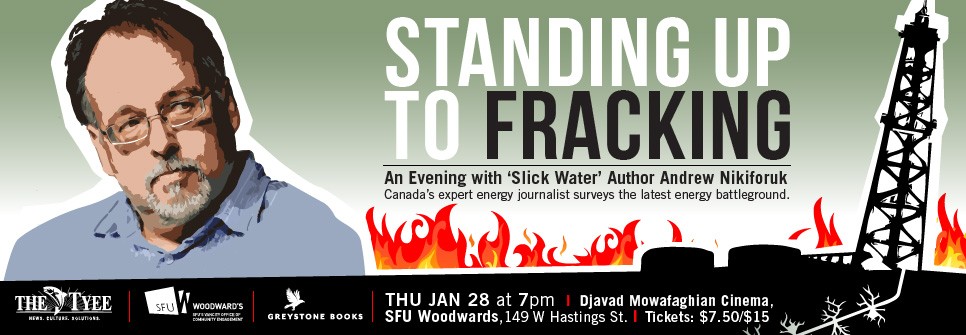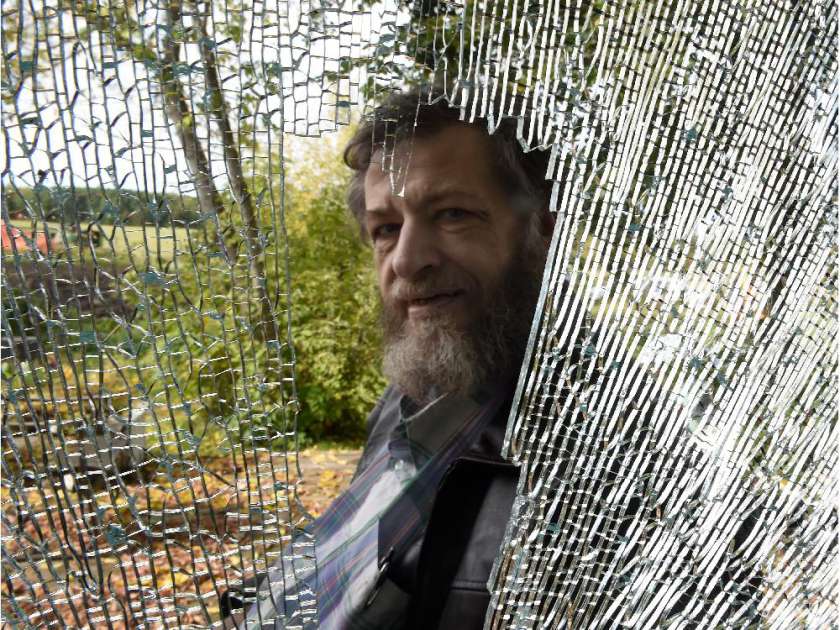Reportedly 300 people attended.
When will we reach the tipping point with fracking? by John Ackermann, January 24, 2016, News1130
VANCOUVER (NEWS 1130) – Hydraulic fracturing, or fracking, has been linked to a record number of earthquakes in BC, Alberta, and elsewhere.
The controversial extraction method is also the subject of the recent book, “Slick Water: Fracking and One Insider’s Stand Against the World’s Most Powerful Industry.”
Journalist Andrew Nikiforuk, who has been covering the oil and gas sector for two decades, devoted the book to the ongoing legal battle waged by Jessica Ernst to save her land from the damaging effects of fracking.
“Her lawsuit against Encana and the Alberta government has been slowly proceeding through the court, but it really won’t go anywhere until the Supreme Court [of Canada] decides whether or not the Alberta regulator should be part of that lawsuit.”
Nikiforuk says Ernst is a unique case.
“She’s never seen herself as an activist of any kind,” he points out.
“Fundamentally, she sees herself as a scientist, as a member of the industry, who is just simply trying to get the regulator and the government to uphold their own regulations and to account for the contamination of groundwater in her community.”
Fifteen per cent of sales from “Slick Water” will be donated to her legal defense fund.
Nikiforuk points out fracking has been linked to thousands of earthquakes.
“Fracking is earthquake-making activity,” he says.
“Everyone said the earthquakes would stay at a magnitude of 1.0 or 2.0, which are at a level you cannot feel, and now we’re up to levels of 4.6 in British Columbia and 4.8 in Alberta. I mean, that’s astounding.”
He predicts it will likely take a magnitude 5.0 or greater earthquake that damages homes and public infrastructure for any meaningful change to happen.
In the meantime, Nikiforuk says the oil and gas sector will keep on fracking as long as it can get away with it.
“Industry will carry it as far as they can because, to them, this is the only way they can still do business, is by using this very imprecise, unpredictable technology to crack open very low grade rocks deep in the ground.”
Nikiforuk will be appearing at the SFU Woodwards campus in Downtown Vancouver for an event this Thursday. [Emphasis added]
The Tyee An Evening with Acclaimed Energy Journalist and Author, Andrew Nikiforuk
Eventbrite Standing up to Fracking: An evening with ‘Slick Water’ Author Andrew Nikiforuk
Book review: Slick Waters shows us the human face of fracking by Vancouver Sun, January 22, 2016 Published in Montreal Gazette (January 22, 2016), Edmonton Journal and Calgary Herald (both January 21, 2016)
Andrew Nikiforuk is an award-winning journalist and author who has written about energy, economics and the West for more than three decades. In his new book he tells the story of Jessica Ernst — the biologist and longtime oilpatch consultant who alleges that energy giant Encana secretly fracked hundreds of gas wells [directly into fresh water zones] around her home, [and directly into] her community’s drinking water aquifer. She has an ongoing lawsuit against Encana, Alberta Environment, and the Energy Resources Conservation Board.
Q: Tell us how you first discovered Jessica Ernst’s story and why you decided to dedicate a book to it (and the subject of fracking.)
A: I first met Jessica Ernst while on assignment for the Globe and Mail in 2004. At the time I had little understanding of fracking and was writing about the dramatic rise in natural gas prices and the cracking of coal seams for methane. I didn’t know it at the time that her story was really a preview of how the fracking revolution would play out across rural and urban North America. Her story encapsulated the whole fracking experience which is really a multi-billion dollar and disparate science experiment using a technology that chaotically shatters rocks underground. Shale gas is not a revolution but a retirement party.
Q: Slick Water interweaves Ernst’s story with facts and opinions about fracking and the oil and gas industry — in Canada and worldwide. Can you tell us how you structured the book?
A: There have been a lot of bad books written about fracking. Most were fact laden and terribly abstract. Many excluded people altogether. I didn’t want to do that. It was important to tell stories within the story and the history of fracking reads like some fantastic comic book.
Q: Almost all of your books have a strong narrative element to them. Which comes first — the personal stories and struggles, or the facts about a particular energy issue? Do you see a difference in popular opinion, and reaction, if personal narratives (not necessarily yours) are involved?
A: They all matter. You have to establish the facts first to make sure there is a clear wrong that explains the human struggle. And then you flesh out the narrative. Our lives are stories, and we understand the world through good story telling. Jessica Ernst is living one helluva story that speaks to all of us. But mostly it is a tale about the courage of women.
Q: In December, experts confirmed that a 4.6 magnitude earthquake in northeast B.C. was caused by fracking. Do you think the correlation between fracking and earthquakes will change perceptions about the practice in B.C.?
A: Earthquakes have already debunked the industry’s claim that the technology is safe and proven throughout North America. In addition to the risk these earthquakes pose to public safety, industry triggered seismic activity rattles existing energy plumbing and makes another huge liability, leaking wells, an even worse one. The earthquakes can also release lots of gases from the earth including radon, methane and CO2. I have no doubt that swarms of industry-made earthquakes will change how the industry is perceived. A good neighbour doesn’t cause earthquakes.
Q: Are you optimistic about Canada’s potential to move to renewable resources in the near future? What do you think B.C. residents should be lobbying both the provincial and federal Liberal parties to legislate?
A: The B.C. government seems wedded to a corporate energy model: shale gas fracking combined with Big Hydro with lots of subsidies for corporations. It is very difficult for governments to draw a revenue stream from small-scale or community based renewable projects. As a result governments are reluctant to encourage renewables. Renewables require different scales and different thinking and even a different economy. And no one wants to talk about the need to use less energy, period. Am I optimistic? We’ll need a string of crises and scandals to get us moving in the right direction.
Press Gallery Episode 117: The First Order edition by Edmonton Journal, January 8, 2016
Sheila [Pratt]’s pick:
Slick Water: Fracking and One Insider’s Stand Against the World’s Most Powerful Industry, by Andrew Nikiforuk
‘Turning a blind eye:’ Oilpatch impacts concern mayor of Alberta town by Bob Webber, The Canadian Press, January 14, 2016, News1130
FOX CREEK, Alta. – The mayor of an Alberta town in an area of heavy hydraulic fracking is expressing concern over the oil industry’s impact after yet another earthquake hit his community.
“Fox Creek town council is very concerned,” Jim Ahn wrote in a letter to reporters Wednesday. “It seems industry and the provincial government have been turning a blind eye as to what has been going on in our area.” [What the legally immune, “No Duty of Care,” Charter violating AER does best!]
Fox Creek, a resource town that relies on oil, gas and forestry for its jobs, was hit Tuesday by a quake that measured 4.8 on the Richter scale — big enough to rumble buildings and shake pictures on the wall and count as the strongest ever recorded in Alberta.
It was the town’s 367th seismic event since January 2015.
The Alberta Energy Regulator hasn’t definitively linked the activity to the amount of fracking in the area, but it has implemented special regulations and is conducting research.
Earthquakes aren’t the only thing Ahn is concerned about.
“We have industry pulling water from our rivers, streams and lakes at rates we feel far exceed their capabilities to replenish themselves,” he wrote. “We do not want to be left with swamps that were once prize trophy lakes.”
The town has had to spend $300,000 to truck in water after levels in the aquifers it normally depends on fell too low, said Ahn. It has received whistleblower reports of drilling rig leaks that could affect Fox Creek’s water supply and received contradictory messages from those involved.
In an interview, Ahn said the town’s frustration is mostly with the regulator for, too often, not telling Fox Creek about what’s going on.
“They just leave us in the dark.”
When the regulator does communicate, it doesn’t consider the realities of a small town, the mayor suggested.
Council must apply — and pay — to get specifics on who’s drilling for what, and where. The regulator approves water withdrawal licences and gives the town — which has a volunteer council that meets twice a month — 10 days to respond, Ahn said. And when it does, it’s ignored.
“Even if we oppose the application, it still goes through.”
Fox Creek is trying to sell itself as a good place to start a business and raise a family and news about well blowouts and earthquakes doesn’t help, Ahn said.
“We have spent millions of dollars to try and attract people to come here … what we do not need is negative headlines.”
Ahn said council has invited Alberta Premier Rachel Notley to visit the town and speak with council about its concerns. Notley has not yet replied, he said.
Energy Minister Margaret McCuaig-Boyd said in a statement late Wednesday afternoon that she will be in touch with Ahn to discuss his concerns and how they can be addressed.
“Families in Alberta expect our energy resources to be extracted safely and sustainably. When this seismic event was recorded, operations ceased immediately. This was done in direct response to seismic activity regulations that the AER has in place. Companies in the area know these regulations well and co-operated willingly,” she said.
An AER spokeswoman said in a statement that the town’s water level concerns should be addressed by Alberta Environment and Parks. [Really? How convenient to play spin the regulator bottle]
“The AER responds to all stakeholder concerns, including those of municipalities, ensuring accurate and timely information is provided as soon as it is available. For example, implementing Subsurface Order #2, and the traffic light protocol last year, was a direct and swift response to an issue that we saw needed addressing specifically in the Fox Creek area,” the statement said. [Emphasis added.]
DID AER’S PROTOCOL PROTECT THIS ALBERTAN’S HOME?





